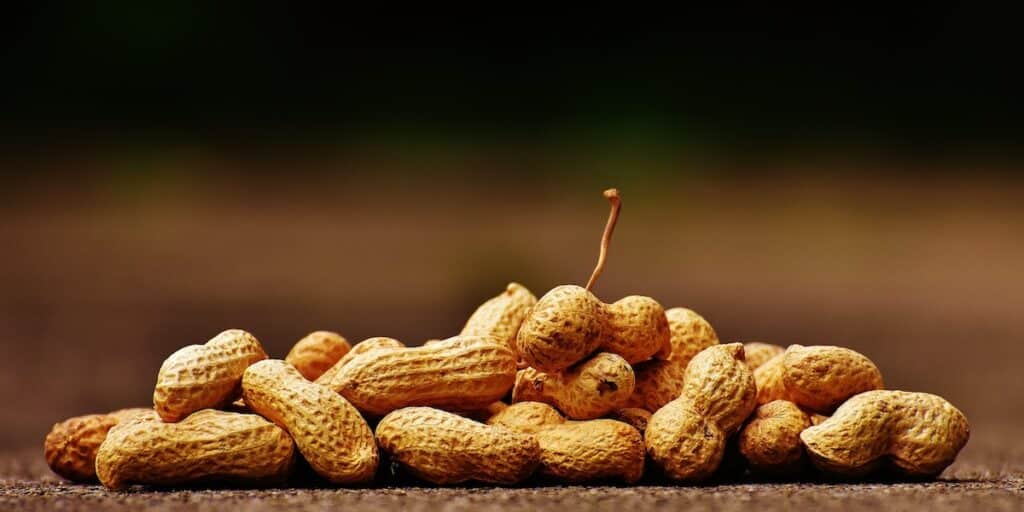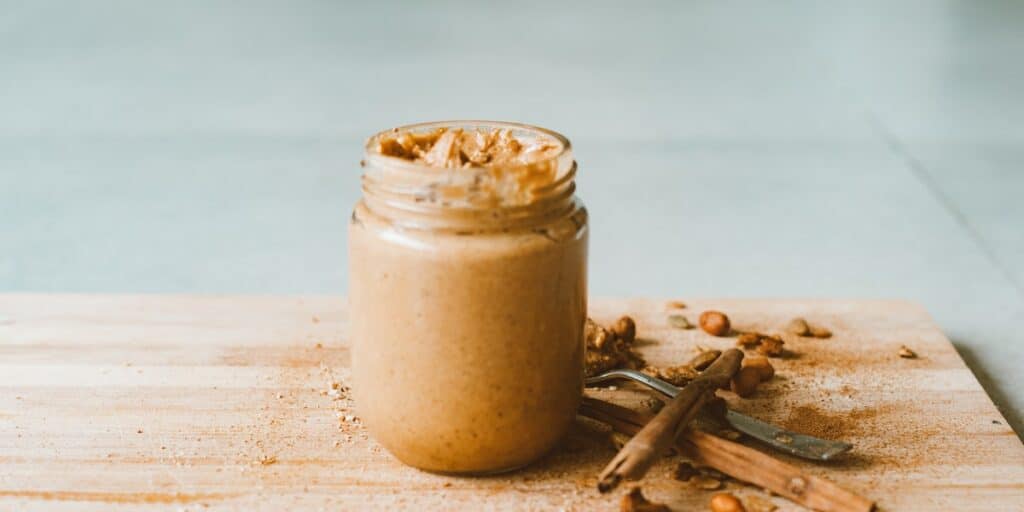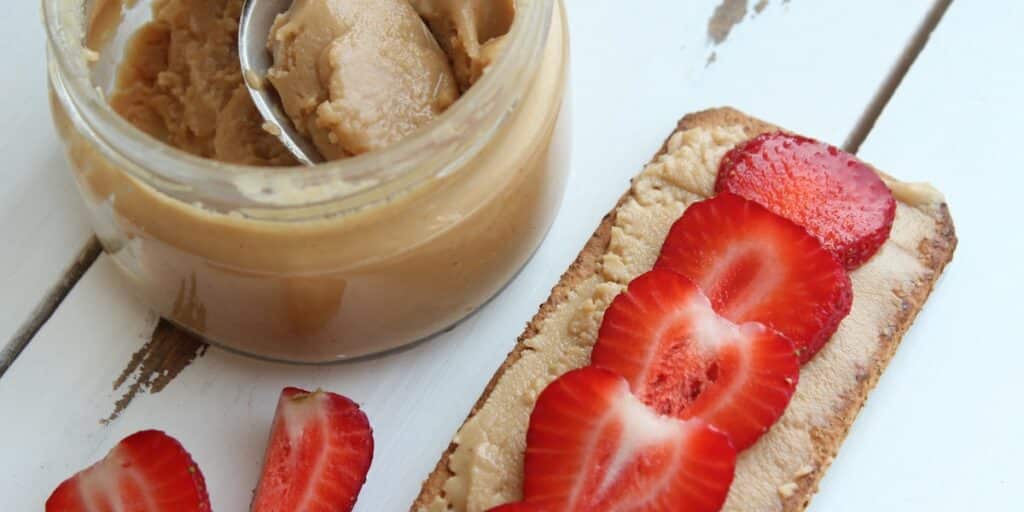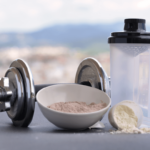Peanut butter, a beloved and classic food spread, has been a staple in kitchens around the world for decades. Loved for its creamy texture and nutty flavor, peanut butter is not only delicious but also rich in nutrients. However, due to its relatively high calorie and fat content, some people wonder if peanut butter is a suitable choice for those seeking to lose weight or maintain a healthy lifestyle. In this article, we will explore the health benefits of peanut butter, its potential role in weight loss, and how to incorporate it into a balanced diet.
Jump to:
What Is Peanut Butter?
If you’ve never seen it before, peanut butter is a typically creamy (sometimes chunky) brown substance that is very sticky and gooey. Natural peanut butter normally has oil sitting at the top that you have to stir, though the more processed peanut butter is regularly less oily. There are different peanut butter varieties, but this is usually what you’d see. As for its nutritional value, let’s dive in a little deeper for that.
Nutritional Profile of Peanut Butter:
Here’s a breakdown of the typical nutritional composition per 2-tablespoon (32-gram) serving of peanut butter:
- Calories: 190
- Protein: 8 grams
- Carbohydrates: 7 grams
- Fiber: 2 grams
- Sugars: 3 grams
- Fat: 16 grams (mostly monounsaturated and polyunsaturated fats)
- Vitamin E: 3 mg (15% of the Recommended Daily Intake)
- Niacin (Vitamin B3): 4 mg (20% of the Recommended Daily Intake)
Peanut butter is also a good source of minerals like magnesium, phosphorus, and potassium.

Is Peanut Butter Good for You?
Let’s delve into the various health benefits and discover why peanut butter can be a valuable addition to your diet.
Rich in Micronutrients:
Firstly, peanut butter is not just a tasty treat; it also packs a punch when it comes to essential micronutrients starting with…
- Vitamin E: An antioxidant that helps protect cells from damage, vitamin E is essential for healthy skin and immune function. Peanut butter provides a notable amount of this vitamin, contributing to your daily requirements.
- Niacin (Vitamin B3): Niacin is crucial for converting food into energy and supporting the nervous system. Peanut butter contains significant amounts of niacin, helping to meet your daily needs.
- Magnesium: This mineral is involved in over 300 biochemical reactions in the body, contributing to muscle and nerve function, immune support, and bone health. Peanut butter serves as a good source of magnesium, supporting your overall well-being.
- Phosphorus: Essential for bone health and cell function, phosphorus is another valuable mineral present in peanut butter.
- Potassium: Known for regulating blood pressure and supporting heart health, potassium can also be found in peanut butter.

It’s A Good Source of Protein:
Protein is an essential macronutrient responsible for building and repairing tissues, producing enzymes and hormones, and supporting immune function. Peanut butter, derived from nutrient-dense peanuts, is an excellent plant-based source of protein.
Two tablespoons of peanut butter typically contain around 8 grams of protein, making it a convenient and tasty way to boost your daily protein intake. Incorporating peanut butter into your diet can be especially beneficial for individuals following vegetarian or vegan diets, as it offers an alternative to animal-based protein sources.
Helps With Blood Sugar Management:
Contrary to what some might expect due to its sweet and nutty taste, peanut butter has a low glycemic index (GI). The glycemic index is a measure of how quickly carbohydrates in food raise blood sugar levels. Foods with a low GI are beneficial for those looking to manage blood sugar levels or reduce the risk of type 2 diabetes.
The combination of protein, healthy fats, and fiber in peanut butter contributes to its low glycemic index. When peanut butter is consumed with carbohydrate-containing foods like whole-grain bread or fruit, it can help slow down the absorption of sugars into the bloodstream. This can lead to better blood sugar control and increased feelings of fullness, making it a favorable option for individuals with diabetes or those aiming to stabilize their energy levels.
Health Benefits Of Peanut Butter
From aiding in weight loss to promoting heart health and supporting brain function, peanut butter boasts an impressive array of advantages like:
Weight Loss
Contrary to its decadent taste, peanut butter can be a valuable ally in your weight-loss journey. The combination of protein, healthy fats, and fiber in peanut butter contributes to increased feelings of fullness and satiety, helping to curb hunger and reduce overall calorie intake. By adding a moderate amount of peanut butter to your healthy diet, you may find it easier to manage your weight and stick to a balanced eating plan.
Increased Heart Health
The content in peanut butter includes heart-healthy monounsaturated and polyunsaturated fats that have been associated with reducing bad LDL cholesterol levels and promoting cardiovascular health. Additionally, peanuts contain antioxidants like resveratrol, which can help protect the heart from oxidative damage. Incorporating peanut butter into your diet as part of a balanced and heart-friendly approach may contribute to improved heart health.
Bodybuilding
Peanut butter is an excellent source of protein, making it a fantastic addition to the diets of athletes and bodybuilders who are looking for muscle growth. Protein is essential for muscle repair, making peanut butter a convenient and tasty way to meet your protein needs. Whether spread on whole-grain toast or blended into a protein-rich smoothie, peanut butter can support your fitness goals.
Managing Blood Sugar Levels
Despite its carbohydrate content, the consumption of peanut butter causes a slower rise in blood sugar levels. This property can be particularly beneficial for individuals with diabetes or those looking to manage their blood sugar levels. Including peanut butter in your meals or snacks can help stabilize energy levels and prevent sudden spikes in blood sugar.
Reducing The Risk of Diseases
Peanuts are rich in bioactive compounds that contribute to overall health and may reduce the risk of certain diseases. The antioxidants in peanuts, such as resveratrol and vitamin E, can help neutralize harmful free radicals, reducing the risk of chronic diseases like cancer and cardiovascular diseases. Additionally, the high content of niacin in peanut butter has been linked to a reduced risk of age-related cognitive decline and a lowered risk of heart disease.
You’ll Increase Your Brainpower
Peanut butter contains choline, a nutrient essential for brain health and function. Choline plays a crucial role in supporting memory, mood regulation, and cognitive function. By including peanut butter in your diet, you provide your brain with a valuable nutrient to keep it sharp and functioning optimally.
You May Get a Better Night’s Sleep
Peanut butter contains something called tryptophan, an amino acid that is a precursor to serotonin, a neurotransmitter involved in regulating mood and sleep. Consuming foods rich in tryptophan, such as ground peanut butter, may contribute to better sleep quality and help you achieve a restful night’s sleep.
You May Reduce Chronic Inflammation
Chronic inflammation is associated with various health issues, including heart disease, diabetes, and arthritis. Peanuts contain anti-inflammatory compounds that may help reduce inflammation in the body when included as part of an anti-inflammatory diet.
Lowered Cravings
The protein and healthy fats in peanut butter can help stabilize blood sugar levels and reduce hunger cravings. By satisfying your appetite with peanut butter, you may be less tempted to reach for unhealthy snacks between meals, making it easier to maintain a balanced and nutritious diet.

Why Some Peanuts Are Unhealthy
While peanuts offer numerous health benefits, they also come with certain drawbacks that may warrant caution when consuming them, these kinds of things may include:
Too Much Omega-6 Fat
Peanuts are a good source of fats, and while they contain healthy monounsaturated and polyunsaturated fats, they are also relatively high in omega-6 fatty acids. While omega-6 fats are essential for the body, an excessive intake of these fats relative to omega-3 fats can lead to an imbalance in the diet.
The modern Western diet often includes an overabundance of omega-6 fats due to the prevalence of processed and fried foods, which are typically made with vegetable oils rich in omega-6 fatty acids. Consuming too many omega-6 fats in relation to omega-3 fats may promote inflammation in the body, potentially contributing to various health issues.
Peanuts Often Contain Mold and Cause Allergies
One significant concern with peanuts is their susceptibility to mold contamination. Peanuts are grown underground, making them more vulnerable to fungal growth, especially in warm and humid conditions. Certain molds can produce mycotoxins, harmful substances that can pose health risks when consumed in large quantities.
Moreover, peanuts are among the most common food allergens. Peanut allergies can range from mild to severe, with potential life-threatening anaphylactic reactions in sensitive individuals. Those with peanut allergies must strictly avoid peanuts and peanut-containing products to prevent allergic reactions.
It’s High in Calories and Fat
While peanuts are a nutrient-dense food, they are calorie-dense as well. A small serving of peanuts can quickly add up in calories, and excessive calorie intake without sufficient physical activity can lead to weight gain and other health issues.
Mindful portion control is essential when consuming peanuts, especially for those aiming to manage their weight. Incorporating peanuts into a balanced diet while monitoring overall calorie intake can help reap their health benefits without unwanted consequences.
It May Make You Bloated
Another concern some people face with peanuts is bloating and digestive discomfort. Peanuts are relatively high in fiber, which is beneficial for digestion, but they can also cause bloating and gas in certain individuals, particularly when consumed in large quantities.
Additionally, peanuts contain phytic acid, which can hinder the absorption of certain minerals like iron and zinc. Soaking or roasting peanuts can help reduce phytic acid levels and improve mineral absorption.
If you notice bloating or digestive issues after eating peanuts, it may be prudent to moderate your intake or explore alternative snacks to avoid discomfort.
You May Get More Unhealthy Additives
Commercially available peanut products, such as peanut butter and flavored peanuts, may contain unhealthy additives like added sugars, hydrogenated oils, and excessive salt. These additives can undermine the potential health benefits of peanuts and contribute to various health issues if consumed regularly.
Reading ingredient labels carefully and opting for all-natural peanut butter with minimal additives can help ensure you’re getting the most out of this nutritious nut without unwanted extras.














